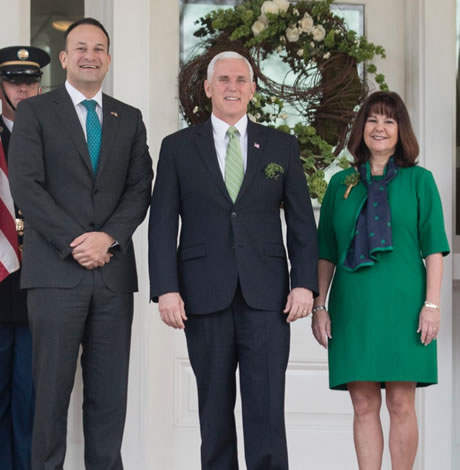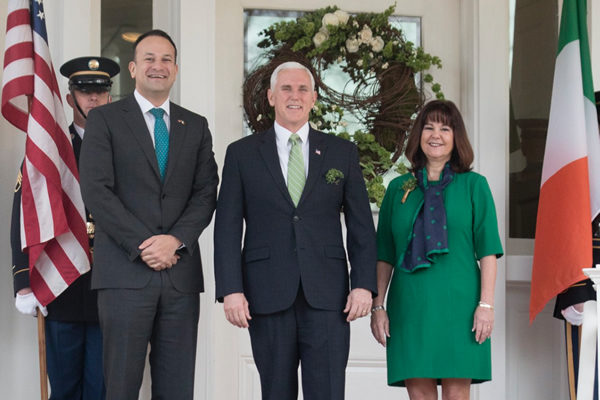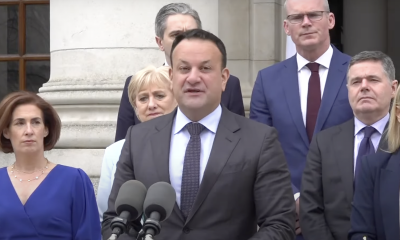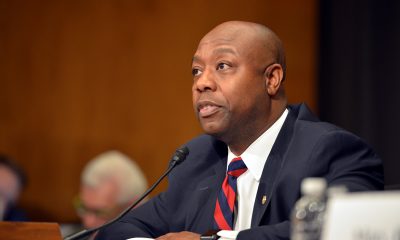Arts & Entertainment
Pence criticized for excluding media from breakfast with gay Irish PM
U.S.-Irish leaders meet for St. Patrick’s Day events


Vice President Mike Pence (center) and Second Lady Karen Pence (right) met with the gay Irish PM Leo Vardakar for St. Patrick’s Day breakfast. (Photo courtesy Twitter)
Vice President Mike Pence is taking heat for excluding the media from his breakfast meeting with Irish Prime Minister Leo Varadkar, who is gay.
The breakfast at the Naval Observatory is a tradition for St. Patrick’s Day, which is a time when the Irish leader makes his annual visit to Washington to meet with U.S. leaders. This year, Varadkar was representing Ireland during his first year as prime minister.
But this year was different than previous years: The breakfast was now between an openly gay leader of Ireland and a vice president with a draconian anti-gay record. What’s also different is that in the past reporters were able to attend the breakfast, but this time the exchange was closed to the media.
Prior to the breakfast, Varadkar was quoted in the Ireland publication TheJournal.ie as saying he’d like to raise LGBT issues with the vice president during the breakfast.
“I am going to be meeting him over breakfast on Friday morning, so if I have the opportunity I will certainly be mentioning the wider issue of equal rights and freedoms for LGBT citizens,” Varadkar said.
The nation’s largest LGBT group, the Human Rights Campaign, pounced on the closed-press nature of the breakfast as evidence Pence didn’t want to be seen with a gay person or be held accountable for his anti-LGBT record.
Ahead of his meeting with anti-#LGBTQ Mike Pence, Ireland’s openly gay Prime Minister Leo Varadkar said he wanted to bring up LGBTQ rights at the meeting.
Today, @mike_pence banned the media from covering the event.
Coincidence? ?
We don’t think so. https://t.co/ouJirE7dSL
— Human Rights Campaign (@HRC) March 15, 2018
Pence has an extensive anti-LGBT history. As a U.S. House member, Pence backed a U.S. constitutional amendment that would have banned same-sex marriage; he also opposed hate crimes protections legislation, “Don’t Ask, Don’t Tell” repeal and a version of the Employment Non-Discrimination Act.
Most prominently, Pence in 2015 as Indiana governor signed a “religious freedom” bill allowing businesses and individuals to refuse services and discriminate against LGBT people. After pressure from LGBT advocates and the business community, Pence was forced to sign a “fix” to the law significantly limiting its scope.
Pence has been dogged by comments from his 2000 campaign for the U.S. House stipulating he would support HIV/AIDS funding on the condition that resources are directed to institutions that “provide assistance to those seeking to change their sexual behavior.” That has been interpreted as support for “ex-gay” conversion therapy, although Pence through a spokesperson has denied he ever supported the practice.
The perception Pence backed conversion therapy came to the fore during the Winter Olympics when gay skater Adam Rippon said he wouldn’t meet with Pence because he “funded gay conversion therapy.” A Pence spokesperson asserted the claim was false. Tension grew when USA Today reported Pence sought a meeting with Rippon, but the skater declined it. Pence tweeted out the article was fake and pledged support for Rippon, but the public didn’t buy it based on the vice president’s anti-LGBT history.
Although the breakfast itself within the Naval Observatory was closed to media, reporters were granted access outside for Pence’s invite of Varadkar to the event. According to the U.K.-based Independent, Pence ignored questions shouted at him by reporters and Varadkar didn’t respond to a question about whether he’d bring up same-sex marriage with Pence.
Alyssa Farrah, a Pence spokesperson, affirmed the breakfast itself was closed to the press and said the two leaders already appeared together at events in the White House that were open to the media.
“The vice president and the prime minister met and spoke together at multiple events yesterday,” Farrah said. “Today’s informal breakfast is set up like every breakfast the vice president has had with a foreign leader following their meetings at the White House.”
According to the Irish media, the decision to close the event to press was made by the Pence camp. Farrah denied the breakfast was made closed press at behest of the vice president, but didn’t respond to a follow-up email on who made the decision.
Sources within the vice president’s office said there’s no precedent for open or closed press for this breakfast, even though last year’s breakfast was open press, because it’s only the second time the vice president has participated. (In 2015 and 2016, the breakfasts between then-Vice President Joseph Biden and then-Irish Prime Minister Enda Kenny were open press.)
The vice president’s office made public transcripts of remarks from Pence and Varadkar during the breakfast. Not once during those remarks, according to the transcripts, did either of the leaders articulate views on LGBT rights, despite Varadkar’s pledge to bring it up.
Also made public via the vice president’s Twitter account were photos of Pence and Varadkar together during the breakfast, which were captioned with words from Pence praising the U.S.-Ireland relationship.
Karen & I were honored to welcome Taoiseach Varadkar to our home at the Naval Observatory for an Irish breakfast. #StPatricksDay is the perfect time to celebrate our friendship & to marvel at Ireland’s lasting mark on America and the American people. pic.twitter.com/S9yroBwnf7
— Vice President Mike Pence (@VP) March 16, 2018
Honored to have joined @POTUS as we welcomed Irish Prime Minister Leo Varadkar to the @WhiteHouse today. Productive meetings with him & enjoyed celebrating the strong partnership between the U.S & Ireland at the #FriendsOfIreland Lunch & the annual Shamrock Exchange. pic.twitter.com/kz8MSGsxLd
— Vice President Mike Pence (@VP) March 16, 2018
Photos
PHOTOS: Montgomery County Pride in the Plaza
LGBTQ celebration held in downtown Silver Spring

Montgomery County Pride in the Plaza was held on Sunday, June 29 at Veterans Plaza in Silver Spring, Md.
(Washington Blade photos by Michael Key)























The fifth annual Fredericksburg Pride march and festival was held on Saturday, June 28. A march through the streets of downtown Fredericksburg, Va. was followed by a festival at Riverfront Park.
(Washington Blade photos by Michael Key)



















India
Anaya Bangar challenges ban on trans women in female cricket teams
Former Indian cricketer Sanjay Bangar’s daughter has received support

Anaya Bangar, the daughter of former Indian cricketer Sanjay Bangar, has partnered with the Manchester Metropolitan University Institute of Sport in the U.K. to assess her physiological profile following her gender-affirming surgery and undergoing hormone replacement therapy.
From January to March 2025, the 23-year-old underwent an eight-week research project that measured her glucose levels, oxygen uptake, muscle mass, strength, and endurance after extensive training.
The results, shared via Instagram, revealed her metrics align with those of cisgender female athletes, positioning her as eligible for women’s cricket under current scientific standards. Bangar’s findings challenge the International Cricket Council’s 2023 ban on transgender athletes in women’s cricket, prompting her to call for a science-based dialogue with the Board of Control for Cricket in India and the ICC to reform policies for trans inclusion.
“I am talking with scientific evidence in my hand,” Bangar said in an interview posted to her Instagram page. “So, I hope, this makes an impact and I will be hoping to BCCI and ICC talking with me and discussing this further.”
On Nov. 21, 2023, the ICC enacted a controversial policy barring trans women from international women’s cricket. Finalized after a board meeting in Ahmedabad, India, the regulation prohibits any trans player who has experienced male puberty from competing, irrespective of gender-affirming surgery or hormone therapy. Developed through a 9-month consultation led by the ICC’s Medical Advisory Committee, the rule aims to safeguard the “integrity, safety, and fairness” of women’s cricket but has drawn criticism for excluding athletes like Canada’s Danielle McGahey, the first trans woman to play internationally. The policy, which allows domestic boards to set their own rules, is slated for review by November 2025.
Bangar shared a document on social media verifying her participation in a physiological study at the Manchester Metropolitan University Institute of Sport, conducted from Jan. 20 to March 3, 2025, focused on cricket performance. The report confirmed that her vital metrics — including hemoglobin, blood glucose, peak power, and mean power — aligned with those of cisgender female athletes. Initially, her fasting blood glucose measured 6.1 mmol/L, slightly above the typical non-diabetic range of 4.0–5.9 mmol/L, but subsequent tests showed it normalized, reinforcing the study’s findings that her physical profile meets female athletic standards.
“I am submitting this to the BCCI and ICC, with full transparency and hope,” said Bangar. “My only intention is to start a conversation based on facts not fear. To build space, not divide it.”
In a letter to the BCCI and the ICC, Bangar emphasized her test results from the Manchester Metropolitan University study. She explained that the research aimed to assess how hormone therapy had influenced her strength, stamina, hemoglobin, glucose levels, and overall performance, benchmarked directly against cisgender female athletic standards.
Bangar’s letter to the BCCI and the ICC clarified the Manchester study was not intended as a political statement but as a catalyst for a science-driven dialogue on fairness and inclusion in cricket. She emphasized the importance of prioritizing empirical data over assumptions to shape equitable policies for trans athletes in the sport.
Bangar urged the BCCI, the world’s most influential cricket authority, to initiate a formal dialogue on trans women’s inclusion in women’s cricket, rooted in medical science, performance metrics, and ethical fairness. She called for the exploration of eligibility pathways based on sport-specific criteria, such as hemoglobin thresholds, testosterone suppression timelines, and standardized performance testing. Additionally, she advocated for collaboration with experts, athletes, and legal advisors to develop policies that balance inclusivity with competitive integrity.
“I am releasing my report and story publicly not for sympathy, but for truth. Because inclusion does not mean ignoring fairness, it means measuring it, transparently and responsibly,” said Bangar in a letter to the BCCI. “I would deeply appreciate the opportunity to meet with you or a representative of the BCCI or ICC to present my findings, discuss possible policy pathways, and work towards a future where every athlete is evaluated based on real data, not outdated perceptions.”
Before her transition, Bangar competed for Islam Gymkhana in Mumbai and Hinckley Cricket Club in the U.K., showcasing her talent in domestic cricket circuits. Her father, Sanjay Bangar, was a dependable all-rounder for the Indian national cricket team from 2001 to 2004, playing 12 test matches and 15 One Day Internationals. He later served as a batting coach for the Indian team from 2014 to 2019, contributing to its strategic development.
Cricket in India is a cultural phenomenon, commanding a fanbase of more than 1 billion, with more than 80 percent of global cricket viewership originating from the country.
The International Cricket Council, the sport’s governing body, oversees 12 full member nations and more than 90 associate members, with the U.S. recently gaining associate member status in 2019 and co-hosting the 2024 ICC Men’s T20 World Cup. The BCCI generated approximately $2.25 billion in revenue in the 2023–24 financial year, primarily from the Indian Premier League, bilateral series, and ICC revenue sharing. The ICC earns over $3 billion from media rights in India alone for the 2024–27 cycle, contributing nearly 90 percent of its global media rights revenue, with the BCCI receiving 38.5 percent of the ICC’s annual earnings, approximately $231 million per year.
Women’s cricket in India enjoys a growing fanbase, with over 300 million viewers for the Women’s Premier League in 2024, making it a significant driver of the sport’s global popularity. The International Cricket Council oversees women’s cricket in 12 full member nations and over 90 associate members, with the U.S. fielding a women’s team since gaining associate status in 2019 and competing in ICC events like the 2024 Women’s T20 World Cup qualifiers. The BCCI invests heavily in women’s cricket, allocating approximately $60 million annually to the WPL and domestic programs in 2024–25, while contributing to the ICC’s $20 million budget for women’s cricket development globally. India’s media market for women’s cricket, including WPL broadcasting rights, generated $120 million in 2024, accounting for over 50 percent of the ICC’s women’s cricket media revenue.
“As a woman, I feel when someone says that they are women, then they are, be trans or cis. A trans woman is definitely the same as a cis woman emotionally and in vitals, and specially, when someone is on hormone replacement therapy. Stopping Anaya Bangar from playing is discrimination and violation of her rights. It is really sad and painful that every trans woman need to fight and prove their identity everywhere,” said Indrani Chakraborty, an LGBTQ rights activist and a mother of a trans woman. “If ICC and BCCI is stopping her from playing for being transgender, then I will say this to be their lack of awareness and of course the social mindsets which deny acceptance.”
Chakraborty told the Blade that Bangar is an asset, no matter what. She said that the women’s cricket team will only benefit by participation, but the discriminating policies are the hindrance.
“Actually the transgender community face such discrimination in every sphere. In spite of being potent, they face rejection. This is highly inhuman. These attitudes is regressive and will never let to prosper. Are we really in 2025?,” said Chakraborty. “We, our mindset and the society are the issues. We, as a whole, need to get aware and have to come together for getting justice for Anaya. If today, we remain silent, the entire community will be oppressed. Proper knowledge of gender issues need to be understood.”
The BCCI and the International Cricket Council have not responded to the Blade’s repeated requests for comment.
-

 District of Columbia5 days ago
District of Columbia5 days agoActivists protest outside Hungarian Embassy in DC
-

 Virginia4 days ago
Virginia4 days agoSpanberger touts equality, reproductive rights in Arlington
-

 Books4 days ago
Books4 days agoTwo new books on dining out LGBTQ-style
-

 Theater4 days ago
Theater4 days ago‘Andy Warhol in Iran’ a charming look at intersection of art, politics












